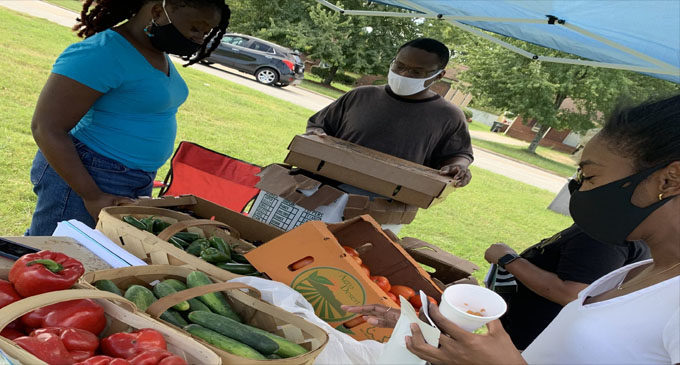Black farmers markets grow in North Carolina
Patrons at The Grove Market in Greensboro shop for vegetables.

By Jodi Helmer, Carolina Public Press
When Ellis Monroe started sharing the fresh basil, oregano, thyme, peppermint, tomatoes and eggplant he grew in raised beds in his backyard with friends and neighbors, they raved about the flavors.
After two successful seasons as a backyard gardener, Monroe purchased a half-acre of land in Chapel Hill, expanded his garden to create Ellis Herbs, and applied to be part of the North Carolina hemp pilot program.
He wanted to expand to a larger audience, but after researching several local farmers markets, he felt there were barriers to participation.
“The other markets were more expensive and were more for farmers who’ve been at this for a while, who were established,” he said.
An Instagram post about the Black Farmers’ Market, a new market in Raleigh and Durham designed to showcase and support Black farmers, gave Ellis a new opportunity.
“It was my first market, but it was their first market, too,” he recalled. “I felt like it was more accessible to me, like they really wanted me to be there.”
The Black Farmers’ Market, launched this year, hosts bimonthly markets that alternate between Raleigh and Durham. Twenty-eight vendors sell local produce and proteins as part of a growing network of similar markets that have been established nationwide in cities like Baltimore, Oakland, Calif., Richmond, Va., and Chicago.
The markets are part of an effort to recognize the barriers Black farmers face and support those who have struggled to succeed in a system built on systemic racism, says Deborah Barnes, director of the Bountiful Land Food for All Farmers Market and chair of the North Carolina NAACP anti-poverty committee.
“The point of the market was to bring food into food deserts, to take food into communities that are denied access to grocery stores,” Barnes said. “We felt like the neighborhood would come out and support Black farmers.”
Black farmers owned more than 37 million acres of land in 1930; the latest Census of Agriculture found that Black farmers own just 4.7 million acres of farmland — a mere 0.5% of all farmland nationwide. In North Carolina, Black farmers run about 1,500 of the state’s more than 46,000 farms.
The Equal Justice Initiative says racial injustices, including discrimination in federal lending practices, denials of private loans, and violence and intimidation caused tax sales and foreclosures, massive Black land loss and the transfer of wealth from Black to white farmers.
Lack of access to land is just one of the barriers modern Black farmers face. Generating revenue from the final product can also be more difficult for Black farmers.
About 30% of Black-owned farms generate less than $1,000 annually, and only 7% generate more than $50,000 in annual revenues, according to the Census of Agriculture.
Organizers hope Black farmers markets can help participating farmers generate livable wages from working the land.
“Guilford County has a lot of farmers markets, but they cater to a more affluent clientele, and the application process can be very exclusive,” said Paula Sieber, executive director of the Guilford Urban Farming Initiative, the nonprofit that operates The Grove Market. “Farmers of color are really struggling, (and) we wanted to be a catalyst for change.”
The response to North Carolina’s three Black farmers markets — The Black Farmers’ Market in Raleigh and Durham, Bountiful Land Food for All Farmers Market in High Point and The Grove Market in Greensboro — has been overwhelming.
A crowdfunding campaign to launch the Black Farmers’ Market raised more than $10,500 in eight weeks to support a living wage for the market manager, produce signage, create a website and establish an assistance fund to help vendors with unexpected costs.
On a busy Saturday morning in Greensboro, hundreds of shoppers visited booths at The Grove Market, purchasing fresh produce from four local farmers and goods from 32 other small businesses owned by people of color. The Guilford market waived the vendor fees for 2020 to increase access for small farmers.
For vendors like Monroe, the interest also translates to sales, which he depends on to continue supporting his farm.
“A lot of people come out who had no idea about Black businesses and Black farmers,” he said. “It’s been great exposure.”
At High Point’s Bountiful Land Food for All Farmers Market, Black farmers have experienced higher-than-anticipated crowds and sales, Barnes said.
“The markets have gotten so much attention that it’s been hard to keep up with the volume,” she said. “Farmers have had to go back to figure out how to keep the produce coming.”
While the markets have been successful for Black farmers, Barnes worries that the events have failed to meet their goals of impacting local communities.
The markets in High Point and Greensboro, established in partnership with the North Carolina NAACP and the nonprofit Loaves and Fishes, were established in food deserts, areas where residents lack access to nutritious foods.
Rather than drawing neighbors to the markets, Barnes said, “The people that come to the market are coming from their middle class homes; the people buying the produce have access to grocery stores.
“It’s supportive — and I don’t want to diminish it—but it means we’re not getting the food to the people who need it, so it won’t fix the problem (of food access), but it does help the farmer.”
The markets accept Supplemental Nutrition Assistance Program (SNAP) and electronic benefit transfer (EBT) payments to ensure low-income shoppers can purchase fresh foods.
In Greensboro, the market purchased 30,000 pounds of fresh produce from participating farmers this season and donated it to local churches and food banks. The nonprofit plans to assemble 27,000 more produce boxes during December to distribute to families living in Guilford County food deserts.
Barnes acknowledges other challenges that might keep people of color from local neighborhoods from shopping at the Black farmers markets: They might lack access to working stoves or refrigerators to cook or store produce or might not know how to prepare unfamiliar foods such as eggplant.
The Bountiful Land Food for All Farmers Market planned to host cooking demonstrations and other educational events, but the COVID-19 pandemic prohibits large gatherings and sharing food samples.
Although Black farmers markets might not be a panacea, for farmers like Monroe, the inclusive space offered the chance to test the market, and the experience proved there was interest in purchasing fresh herbs and CBD products made from North Carolina hemp.
“There is a lack of opportunity and access for minority farmers, and the Black Farmers’ Market created this bubble of access for us and helped open a door,” he said.
“Because of the experience, I’m going to branch out into other markets, and it’s all because I had the opportunity to get out there and build confidence I needed to help me grow my business.”
The Bountiful Land Food for All Farmers Market is located at 701 E. Washington Drive in High Point and is open every Saturday from 10 a.m. – 2 p.m.









